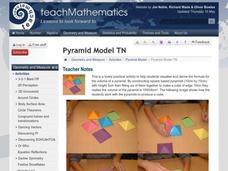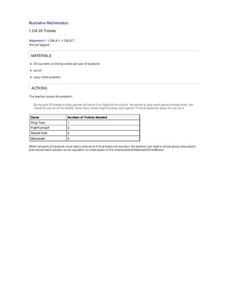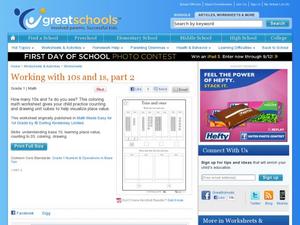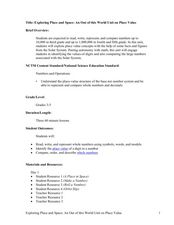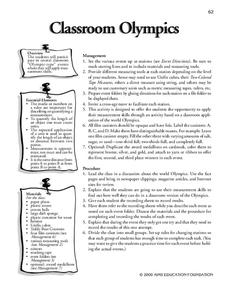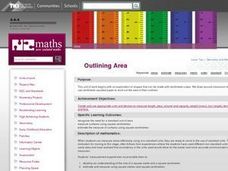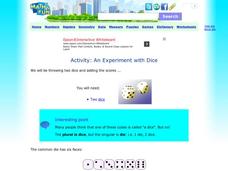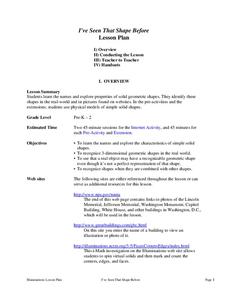Charleston School District
Review Unit 5: Equations
It's time for them to show you what they've learned! The review provides a sampling of the different concepts learned throughout the eight-part series. Learners solve equations by combining like terms, applying the distributive property,...
EngageNY
Solving Equations with Radicals
Show learners how to develop a procedure for solving equations using radicals with the fifth instructional activity of the 25-part module that challenges learners to use properties to solve multi-step quadratic and cubic equations....
Curated OER
"Reviewing Facts Through 10" Lesson Plan
Explore the joy of math with you little learners! They practice creating math problems with numbers from a fact family using numbers 1-10. They work independently with a set of connecting cubes to aid them in creating number sentences...
Jim Noble, Richard Wade & Oliver Bowles
Pyramid Model
Seeking to derive the formula for the volume of a square pyramid, geometry learners construct six square based pyramids that, when pieced together properly, form a cube. Two short videos demonstrate the relationship between pyramid and...
Curated OER
Moose Juice
Math can be delicious with a fun smoothie activity! Kids count the number of fruits that go into a smoothie in an activity activity, draw the fruit in the blender, and complete the addition problem on the side. Each page increases in...
EngageNY
The Volume Formula of a Pyramid and Cone
Our teacher told us the formula had one-third, but why? Using manipulatives, classmates try to explain the volume formula for a pyramid. After constructing a cube with six congruent pyramids, pupils use scaling principles from previous...
Curated OER
How Many Raisins?
Students study the concept of addition. They create verbal number stories with numbers from one to five. They draw a slice of bread with a line down the middle and cut the bread shapes out of a "slice of bread" and a handful of raisins,...
Curated OER
20 Tickets
A great hands-on activity involving adding and subtracting, beginner mathematicians determine how many games can be played with 20 tickets. Instead of tickets, youngsters use 20 counters or linking cubes to represent the amount of...
SEN Teacher
Nets (3D Models)
Let your learners pick and create a fun shape from this custom template. Shapes range from complex geometric figures to the more common cube and prism. Each page can be labeled with your personal directions. Additional printable listed...
Curated OER
Working with 10s and 1s, Part 2
Practice place value by visualizing 10s and 1s. First graders count the cubes in each place, then write the total number at the bottom. In one particularly helpful section, they draw the cubes that will add up to a given number. Bring in...
Illustrative Mathematics
Building toward fluency
Here is a great learning task that focuses on the development of areas in computational fluency including strategies in mental math. Young learners are guided through a list of addition expressions that help them visually understand the...
North Carolina State University
Shapes
Expose youngsters to 3-D objects in a hands-on learning activity involving marshmallows and toothpicks. Engage your young mathematicians by introducing them to 3-D shapes by means of a story book. Explore 3-D shapes by manipulating...
Illustrative Mathematics
Roll & Build
Develop young mathematicians' understanding of place value with this hands-on math activity. Working in pairs, learners take turns building two-digit numbers by rolling two ten-sided dice. Base ten blocks are then used to model the...
Florida Center for Instructional Technology
Two for One Box Company
Given a box of certain dimensions, young mathematicians must determine if a box that is twice as big, actually holds twice as much. This is a brain-teaser of a problem. The worksheet provides a handy table that has learners calculate the...
Curated OER
Two for One Box Company
Here is a challenging and thought-provoking math learning exercise. In it, learners work together to construct a variety of boxes of different sizes to see if doubling the size of a box really means it can hold twice as much stuff as the...
Curated OER
Exploring Place and Space
Students explore number values by completing mathematical worksheets in class. In this decimals lesson, students identify the different place values a number has and the use of decimals to represent a fraction of a number. Students...
Curated OER
Toothbrush Measuring
Ever wonder how many marshmallows long your toothbrush is? Well, you're in luck! This hands-on measurement activity requires young mathematicians to determine the length of their toothbrush using Unifix® cubes, buttons, Cheerios, bear...
AIMS Education Foundation
Classroom Olympics
As the Summer Olympics are approaching, incorporate Olympic-type games into the classroom. From straw javelin to cotton ball shot put, these games are sure to keep leaners engaged. The best part is that there is math involved! Pupils...
Curated OER
Outlining Area
Explore measuring various objects using square centimeters. Learners create various shapes using five centimeter cubes, calculate the area in square centimeters of different classroom objects, and discover who has the largest mouth,...
Curated OER
Activity: An Experiment with Dice
Roll the dice with this activity and teach young mathematicians about probability. Record outcomes for rolling two number cubes in order to determine what is most likely to happen. Graph the data and investigate patterns in the results,...
Curated OER
Multiplication Sequences
In this math worksheet, students learn that a sequence is a set of numbers which follows a mathematical rule. Students look at math sequences and fill in the missing numbers and also explain in words what the pattern is. Some of the...
Curated OER
How Many Letters Are In Your Name?
Students discover how to make a graph that represents the number of letters in their names. In this early childhood math lesson plan, students collect data, categorize data, and develop skills to analyze the pieces of data.
Fayetteville Public Schools
I've Seen That Shape Before
The objectives in the resource allow students to explore the characteristics of simple solid shapes. Youngsters learn to recognize the face shapes, corners, and edges that make up 3-D figures by filling in a chart. Lastly, learners look...
EngageNY
Dividing by (x – a) and (x + a)
Patterns in math emerge from seemingly random places. Learners explore the patterns for factoring the sum and differences of perfect roots. Analyzing these patterns helps young mathematicians develop the polynomial identities.





